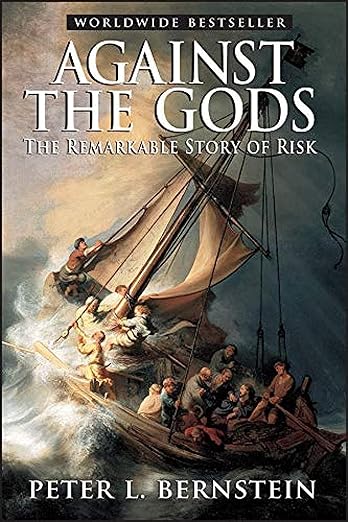Overview of Against the Gods: The Remarkable Story of Risk
-
Book Title: Against the Gods
-
Author: Peter L. Bernstein
-
Publication Date: September 1996
-
Rating: 4.4
-
price: $14.89
-
Pages: 400
About the Author
Peter L. Bernstein, an economist, financial historian, and renowned author, delves into the evolution of risk in *Against the Gods: The Remarkable Story of Risk*. Known for making complex financial concepts accessible, Bernstein explores how humanity learned to understand and manage uncertainty, shaping the foundation of modern finance.
Introduction Against the Gods: The Remarkable Story of Risk
In "Against the Gods: The Remarkable Story of Risk," Peter L. Bernstein takes readers on an intellectual journey through the history of risk management, a concept that underpins modern investing and personal finance strategies. This comprehensive review explores how Bernstein's work illuminates the evolution of risk perception and its impact on financial markets, investment decisions, and broader economic trends.
Against the Gods Book Summary
Bernstein's narrative spans millennia, tracing humanity's relationship with uncertainty from ancient superstitions to contemporary financial models. The book is divided into several key sections:
- The origins of probability theory and its early pioneers
- The development of statistical methods and their application to finance
- The psychological aspects of risk perception and decision-making
- The role of risk management in shaping modern financial markets
Throughout the book, Bernstein weaves together mathematical concepts, historical anecdotes, and economic principles to create a rich tapestry of understanding around risk.
Analysis of Themes
The Evolution of Risk Perception
Bernstein masterfully illustrates how our understanding of risk has transformed over time. From attributing uncertainties to divine intervention to developing complex financial instruments for hedging, the book showcases humanity's growing sophistication in dealing with the unknown. This evolution parallels the development of modern investing strategies and market analysis techniques.
Mathematics and Finance
The author's exploration of probability theory and its application to finance is particularly relevant for those interested in quantitative investing and market trends. Bernstein explains how mathematical innovations, from Pascal and Fermat to modern portfolio theory, have shaped our approach to asset allocation and risk management in personal finance.
Psychological Factors in Risk Assessment
Drawing on the work of behavioral economists like Kahneman and Tversky, Bernstein delves into the psychological biases that influence our perception of risk. This section is crucial for investors and financial advisors, offering insights into why individuals often make irrational financial decisions, especially in volatile market conditions.
Writing Style and Accessibility
Despite tackling complex subjects, Bernstein's writing remains engaging and accessible. He skillfully balances technical explanations with historical context and real-world examples, making the book valuable for both finance professionals and curious laypeople. However, some sections dealing with advanced mathematical concepts may challenge readers without a strong quantitative background.
Strengths and Weaknesses of Against the Gods Book
Strengths:
- Comprehensive historical perspective on risk and finance
- Clear explanations of complex mathematical and financial concepts
- Insightful analysis of the psychological aspects of risk-taking
- Relevant applications to modern investing and market analysis
Weaknesses:
- Some sections may be dense for readers without a finance background
- Limited discussion of non-Western perspectives on risk
- Published in 1996, it lacks coverage of recent financial innovations like cryptocurrencies
Against the Gods Related Books
"Against the Gods" stands out in the finance literature for its historical depth and interdisciplinary approach. While books like Nassim Nicholas Taleb's "The Black Swan" focus more on extreme, unpredictable events, Bernstein's work provides a broader foundation for understanding risk in all its forms. Compared to more practical guides like Benjamin Graham's "The Intelligent Investor," Bernstein's book offers a theoretical and historical context that enriches one's overall understanding of financial markets and decision-making.
Relevance to Modern Finance
Despite being written before the dot-com bubble and the 2008 financial crisis, many of Bernstein's insights remain highly relevant to today's financial landscape. His discussions on market efficiency, risk assessment, and the limitations of predictive models are particularly pertinent in an era of algorithmic trading and big data analytics. For those interested in emerging financial technologies, the book provides a solid foundation for understanding the historical context of risk management, which is essential when evaluating new trends like decentralized finance (DeFi) and blockchain-based banking solutions.
Key Quotes
"The revolutionary idea that defines the boundary between modern times and the past is the mastery of risk: the notion that the future is more than a whim of the gods and that men and women are not passive before nature."
"The essence of risk management lies in maximizing the areas where we have some control over the outcome while minimizing the areas where we have absolutely no control over the outcome."
Highlights from Against the Gods: The Remarkable Story of Risk by Peter L. Bernstein
Evolution of Risk: Explores how risk management evolved, from ancient times to modern finance, changing our understanding of fate and chance.
Probability and Statistics: Highlights the development of probability theory and statistics, fundamental tools for managing uncertainty.
Human Progress: Argues that managing risk has driven advancements in science, economics, and technology, shaping society.
Risk vs. Uncertainty: Differentiates between calculable risks and true uncertainty, emphasizing the limits of forecasting.
Psychology of Risk: Examines how human behavior and biases influence decisions in the face of risk.
Power of Knowledge: Shows how understanding risk empowers people to take control over their futures.
Conclusion and Recommendation
"Against the Gods" is an essential read for anyone serious about understanding the foundations of modern finance and risk management. While it may not offer immediate, actionable investment advice, it provides invaluable context for making informed financial decisions in an increasingly complex economic environment. Whether you're a seasoned investor, a financial professional, or simply curious about the forces shaping our financial world, Bernstein's work offers profound insights that remain relevant in today's fast-paced markets.
For those looking to deepen their understanding of risk and its role in finance, "Against the Gods" is a must-read. It lays a solid foundation for further exploration into advanced investing strategies, market analysis, and personal finance management.




